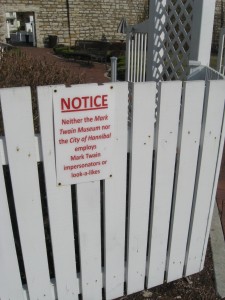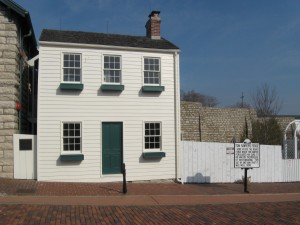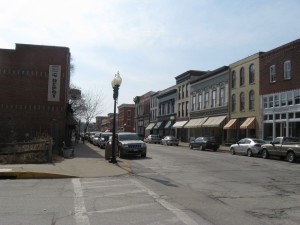how to buy ivermectin  From Cuivre River State Park I drove on up to Hannibal, Missouri. Mark Twain was born just outside town, and he spent his boyhood just up the block from the main intersection, where the road from the river landing crosses Main Street. The town is well-preserved, and Tom Sawyer and Huck Finn turn out to be (as with most good fiction) reworkings rather than imagination ex nihilo: Twain’s house was Tom Sawyer’s house; just behind it was Huck Finn’s house; across the street was Becky Thatcher’s house. All are standing (though Huck Finn’s house is a reconstruction, and all have been overzealously restored). There was even an Injun Joe and a cave – now called Mark Twain cave.
From Cuivre River State Park I drove on up to Hannibal, Missouri. Mark Twain was born just outside town, and he spent his boyhood just up the block from the main intersection, where the road from the river landing crosses Main Street. The town is well-preserved, and Tom Sawyer and Huck Finn turn out to be (as with most good fiction) reworkings rather than imagination ex nihilo: Twain’s house was Tom Sawyer’s house; just behind it was Huck Finn’s house; across the street was Becky Thatcher’s house. All are standing (though Huck Finn’s house is a reconstruction, and all have been overzealously restored). There was even an Injun Joe and a cave – now called Mark Twain cave.
buy prednisolone eye drops online Main Street Hannibal is prosperous, even twee; Twain has become the town business, and as he is one of our most beloved writers, it is business enough. In fact, I cannot immediately call to mind another American writer who has been so enshrined by his hometown. It is a young writer’s dream, to think that the roof that sheltered him, the house of the girl he first loved, and the scenes of his childhood, will someday become his home town’s most cherished monuments. At Becky Thatcher’s house a placard describes her as “the essence of all that is charming in womanhood.” There is even a fence called “Tom Sawyer’s Fence,” though God bless anyone who believes the boards predate the Bush administration.
There is an adequate museum as well, amply illustrated by quotations from Twain’s new autobiography (just published last year, in accordance with Twain’s directions to wait until a hundred years after his death). Standing in the museum was quite extraordinary: as is usually the case with museums, you pass through rooms of people who are intently staring at the walls. But the silence of the galleries was broken time and again by outbursts of laughter, as the museumgoers read Twain’s witticisms about his hometown and upbringing. I’m sure I’ve never experienced anything like it in a museum.
But I cannot pass Twain by without registering some sense of the ultimate defectiveness I feel in his works and even in the man himself; as much as exploring the river made me want to learn what Twain had to say about it, I cannot deny that one of the questions I want answered is what went wrong with Mark Twain. This question haunts me, in part because I know I am not insulated from people asking it about me someday; I am old enough to have found in myself also a defectiveness which seems resistant to all efforts at improvement.
The Adventures of Huckleberry Finn shows this defect all too clearly. I cannot second the esteem this book has enjoyed among writers and intellectuals – as a finished work of art I cannot even rate it with Tom Sawyer – it strikes me as immature, indulgent, and unprincipled to the point of being unrealistic. A whole range of American feelings, even ones directly relevant to the material of the book, simply have no place in it. And this is particularly true of the principles which are the most difficult and impactful, and hence known as “great” – courage in the face of responsibility, principle in times of difficulty – the kinds of things traditionally known as heroism and manhood. It is entirely possible, given the setting of the book, that Huck and Jim could have stumbled across John Brown or some other “low-down abolitionist” instead of the Royal Nonesuch – but Twain as an artist made his choices, and his choice was to rummage about for a target, even one that was out of his way, rather than present an ideal. Orwell, in his fine though occasionally unaccountable little essay about Twain, describes the problem well:
Most people who have studied his work have come away with a feeling that he might have done something more. He gives all the while a strange impression of being about to say something and then funking it, so that Life on the Mississippi and the rest of them seem to be haunted by the ghost of a greater and much more coherent book.
The moment of “funking” Huck Finn comes at Cairo, where Jim and Huck choose not to go north. In short, the task of freeing Jim means having to go against the current, and Twain was not the man for such a task. This is still probably the theme of the Great American Novel – the search for freedom, however conceived – but the writer to do it will need something more than Twain had in him.
As much as personality is a value in itself, there is something direly uniform about life, which binds us all to the same tasks; and if our development is conspicuously defective in some way, Providence is bound to make of it a rack for our torment. I do not know the extent of this problem in Twain; Orwell ascribes it to the equation of success and virtue; and I will add a related phenomenon, the complex of celebrity and admirers, for it is exceptionally difficult not to be enslaved by praise if you ever get any. But what you can feel in Hannibal is the problem of the provinces serving as the awkward cradle to talent: there exudes from Twain an atmosphere of humiliation at having had to be part of Hannibal, Missouri. And what is more, to have been from a slaveholding family, in a slave state, and to have served (if ever so briefly) for the losing side in a cause he later seemingly knew to be immoral. On this last point he directs a great deal of later anger towards the Christian churches, which he frequently mentions as bulwarks of slavery (surely true enough in Missouri). But of course elsewhere they were the vanguard of abolition; what is noteworthy here is the anger which causes him to see only one side. The past has to be transformed into something workable; anger is not solution enough. This too is one of the qualities of freedom: the freedom to be who you are, to be from where you are from, and not to be humiliated by it or overwhelmed by the fact of your own limitation.
This is a common American intellectual phenomenon: the country is filled with small towns which intelligent people abandon and hate. The hope is that this hatred eventually gets synthesized into something more productive; but this was not the case with Twain. From the contemptuousness of his writings I was expecting something slightly less than a perfect “Little House on the Prairie” set: but that is what Hannibal is. Of course it was merely just begun when Twain was there, but even to have been part of the building of a town in the wilderness must have been something. Within Twain’s lifetime it must have become what we see today: a cute brick Main Street and a hinterland of scattered ten-acre farms with lovely farmhouses. He did return to Hannibal later in life, covered with renown, and of course he reverts to humor at a moment where a less ironic approach might have served him better:
Alas! Everything had changed in Hannibal – but when I reached Third or Fourth Street, the tears burst forth, for I recognized the mud. It at least was the same – the same old mud.
This is his general mode of handling almost any serious emotion – bitter humor mixed with morbid sentimentality – and, of course, after awhile it begins merely to feel like a defect. It certainly did not serve him well in his own life, which ended in deep embitterment.
So it is hard to see Hannibal through rose-tinted glasses for long. Even if Becky Thatcher’s ghost is forever looking out the window, or Tom Sawyer painting the fence, it is not really their town; it is the town which Mark Twain left behind. Twain has his grave a thousand miles away, in Elmira, New York; it is hard not to feel that he belongs here by the Mississippi, but died in bitter exile. “Grata patria ingrati filii, ne ossa quidem habebis.”


2 Trackbacks/Pingbacks
[…] read, but the main reason, I would guess, people read them is precisely for their humor. And I just saw the power of Twain’s humor a century later; it was […]
[…] wrote on this blog about a trip of mine to Hannibal, Missouri, the adorable little river-town where Mark Twain spent his boyhood. In our […]
Post a Comment